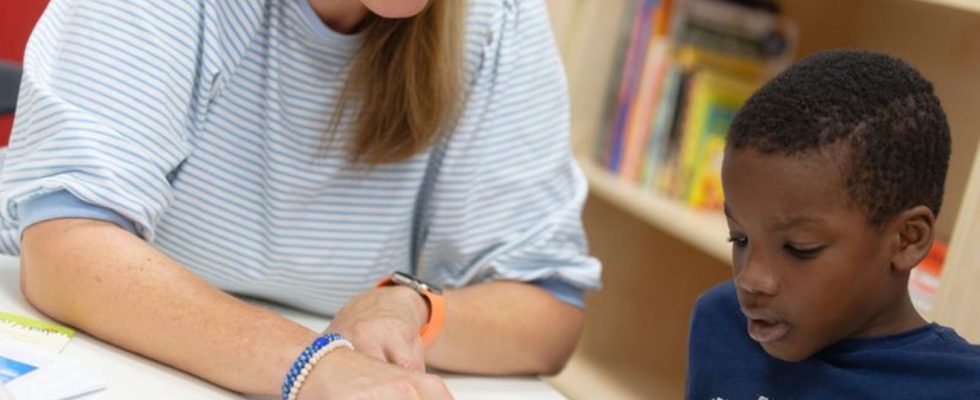According to an igloo study
Reading as a “gateway to the world”: thousands of learning aids
Learning assistant Sabine Güllich supports student Hassan in a reading room at a primary school in Hürth. photo
© Henning Kaiser/dpa
One in four children cannot read properly when they start secondary school. The commitment of thousands of volunteer helpers learning to read comes into focus.
Sabine Güllich and Hassan are a good team: a reading tandem in Hürth near Cologne. The boy has problems reading – as many fourth-grade primary school students across Germany have, as the international Igloo study recently revealed.
Hassan has now caught up enormously. This morning in a reading room at his elementary school, the story is about an adventure mouse Baltic Sea island of Rügen and giraffes in the “Safahne”, no, savannah. A difficult word, Hassan pauses, repeats. He quickly notices mistakes and corrects himself. His reading assistant shows him the line with a bookmark. The boy seems focused, alert, he wants to do everything right.
“It’s fun, it’s not difficult at all,” says Hassan proudly. He is about to turn 9 and has been practicing with Sabine Güllich for an hour every week for almost a year and a half. She is one of 13,000 volunteers who support around 16,600 children with reading difficulties in the “Mentor – The Reading Helpers” association, as federal association spokeswoman Agnes Gorny describes. The tried-and-tested concept has been around for 20 years now: an adult looks after a child for at least one hour a week, for at least a year.
Shock after igloo study
The Igloo elementary school reading study by the Institute for School Development Research at the University of Dortmund revealed glaring weaknesses in reading skills: 25 percent of fourth graders nationwide do not achieve the minimum level, a sharp increase within five years. They are threatened with “significant difficulties in almost all school subjects” on their educational path. Federal Education Minister Bettina Stark-Watzinger (FDP) was also alarmed.
Learning to read properly at school is no longer a given – and this fact brings even more attention to voluntary support with the help of many thousands of committed supporters. Several initiatives provide volunteers who love to read: In Berlin alone, around 2,000 reading sponsors from the VBKI association go to daycare centers and schools every week. In some places, reading grandmas and reading grandpas are on duty. Many elementary schools are looking for volunteers.
Reading in tandems
“Weekly reading together with an adult can be a useful element, even if they are not a trained educator,” says Igloo study director Nele McElvany of the German Press Agency.
Above all, the motivation to read could be promoted and a positive approach to reading books could be opened up. “Of course, this does not replace the didactic teaching of learning to read and reading strategies in class by teachers.” Important: Selecting appropriate texts depending on your level of competence. “The children should neither be over- nor under-challenged.” Fixed tandems are good.
“Regular practice of reading is very important, especially in primary school, as it is the prerequisite for the automation of reading processes and the confident application of reading strategies,” explains the researcher. And central to vocabulary development.
The fact that some countries or schools are now developing concepts to systematically incorporate regular reading into everyday school life is positive – but it depends on the implementation. She thinks reading in fixed small groups or tandem reading is promising.
NRW reacts after igloo shock
North Rhine-Westphalia (NRW) is increasing reading times after the igloo shock. “Reading is the foundation on which our children’s entire education is built. Only those who can read understand blackboard pictures, task texts or mathematical formulas,” emphasizes North Rhine-Westphalia Schools Minister Dorothee Feller (CDU).
Since this school year, a mandatory reading time of at least three 20 minutes per week has been stipulated in primary and special schools. “Behind this formula there is a concept that is both scientifically sound and practical.” The support from extracurricular partners such as reading assistants is “very welcome”.
Better grades as a result
Reading mentor Güllich is convinced: “Reading is the gateway to the world, and every small step is important as a building block for greater reading ability and text comprehension.” The reading support runs in close consultation with the school, which also selects the children with special needs. “The feedback from parents is also positive,” reports Güllich.
She has just read a few pages from a children’s newspaper with Hassan. The boy then manages questions about the text pretty quickly. “In the past, I almost never understood the tasks well,” says Hassan. Now he even has better grades. Sabine Güllich relies on a mix of paper and tablet.
Neuroscientist Manfred Spitzer vehemently promotes printed books. It is obvious that children read texts on tablets more distractedly and more shallowly than on paper, he tells the dpa. Hassan is happy when the tablet is involved, but he also likes to read quite thick books, especially “Harry Potter”. And: “I read bedtime stories to my little sister.”

